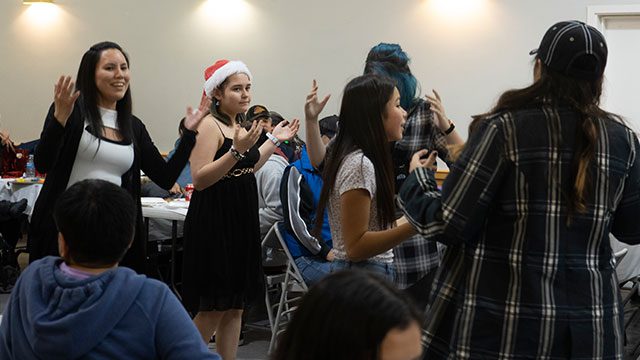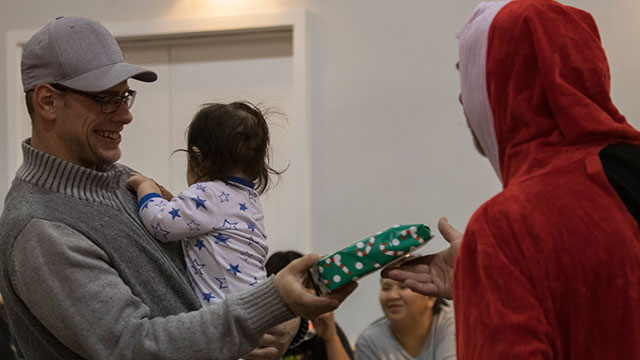
Lee WilsonWhen more than half of your members live outside the community, the annual holiday dinner is about more than eating a meal together.“Lake Babine is only serviced to service on reserve members, so it’s really hard to reach off-reserve members,” said Lake Babine Nation Coun. Verna Power.”We have been trying to be innovative with Lake Babine as trying to enter into a foundation agreement that could recognize the off-reserve members.”West of Prince GeorgeLake Babine Nation, 228 km west of Prince George, is the third-largest band in British Columbia with 2,544 registered members. Like many First Nations across Canada, more than half of its members live off-reserve.Mary-Ann Poirier helped arrange the third-annual holiday dinner in the northern B.C. city of Prince George.“Every year it’s fantastic because we do it by donations, and this year has been the biggest,” said Poirier, a member of Babine Lake Urban Nation.Prince George Mayor Lyn Hall, who has pledged to make improvements after a study found 79 per cent of his city’s homeless population was Indigenous, was able to attend. (Gifts and stories were exchanged at the third-annual dinner. Lee Wilson/APTN)“We always move from place to place, and it’s difficult,” said Poirier, noting off-reserve members struggle with the cost of housing as well as finding support services.”Especially those that don’t have rental references, they have a hard time.”Two events linked to the Canadian government and colonialism are at the root of the displacement: The amalgamation of Fort Babine and Old Fort communities to form Lake Babine Nation; and children taken from their families and forced to attend Lejac Residential School or other day schools in the area.”They came by airplane, and we thought they were big birds,” said Porier. “I saw Mom down there crawling down on the ground, and I’ll never forget that.”Residential schoolsDinah Alec remembers her parents grabbing her and her sister to run into the bushes to hide from those taking children to residential schools. They remained hidden for two months, returning to an isolated Old Fort village that was never developed. The family later left their home.“Coming out here and trying to live for ourselves. Rent, trying to see the doctor, trying to keep clothes on ourselves and food on the table for the children and trying to keep our Elders from getting sick and dying. It was too late; we lost our whole community of Elders.” said Alec.”What we have left is all that’s left.”Today, those families long to return to their First Nation community but face challenges.Funds are limitedPower says the band’s funds are limited and only accounts for on-reserve members.The Foundation Pathway Agreement is one solution being discussed between the nation and provincial government.In the meantime, Poirier will continue to advocate so others don’t have to bury loved ones away from their traditional home.“It makes me want to fight more for our people because I am not the only one who buried a body, a loved one in a foreign land. I guess I think we are in cultural genocide,” said Poirier.
(Gifts and stories were exchanged at the third-annual dinner. Lee Wilson/APTN)“We always move from place to place, and it’s difficult,” said Poirier, noting off-reserve members struggle with the cost of housing as well as finding support services.”Especially those that don’t have rental references, they have a hard time.”Two events linked to the Canadian government and colonialism are at the root of the displacement: The amalgamation of Fort Babine and Old Fort communities to form Lake Babine Nation; and children taken from their families and forced to attend Lejac Residential School or other day schools in the area.”They came by airplane, and we thought they were big birds,” said Porier. “I saw Mom down there crawling down on the ground, and I’ll never forget that.”Residential schoolsDinah Alec remembers her parents grabbing her and her sister to run into the bushes to hide from those taking children to residential schools. They remained hidden for two months, returning to an isolated Old Fort village that was never developed. The family later left their home.“Coming out here and trying to live for ourselves. Rent, trying to see the doctor, trying to keep clothes on ourselves and food on the table for the children and trying to keep our Elders from getting sick and dying. It was too late; we lost our whole community of Elders.” said Alec.”What we have left is all that’s left.”Today, those families long to return to their First Nation community but face challenges.Funds are limitedPower says the band’s funds are limited and only accounts for on-reserve members.The Foundation Pathway Agreement is one solution being discussed between the nation and provincial government.In the meantime, Poirier will continue to advocate so others don’t have to bury loved ones away from their traditional home.“It makes me want to fight more for our people because I am not the only one who buried a body, a loved one in a foreign land. I guess I think we are in cultural genocide,” said Poirier.









